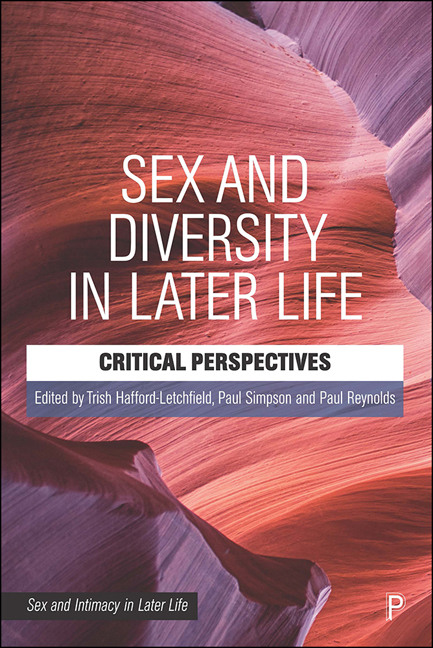Book contents
- Frontmatter
- Dedication
- Contents
- List of figures and tables
- Notes on editors and contributors
- Series editors’ introduction
- Foreword
- 1 Sex and intimacy in later life: a survey of the terrain
- 2 Sexual expression and pleasure among black minority ethnic older women
- 3 Sexual desires and intimacy needs in older persons and towards the end of life
- 4 Heterosexual sex, love and intimacy in later life: what have older women got to say?
- 5 Sex and ageing in older heterosexual men
- 6 Sex and older gay men
- 7 Thinking the unthinkable: older lesbians, sex and violence
- 8 Splitting hairs: Michel Foucault’s ‘heterotopia’ and bisexuality in later life
- 9 The age of rediscovery: what is it like to gender transition when you are 50 plus?
- 10 Ageing asexually: exploring desexualisation and ageing intimacies
- 11 Older people, sex and social class: unusual bedfellows?
- 12 Final reflections: themes on sex and intimacy in later life
- Index
7 - Thinking the unthinkable: older lesbians, sex and violence
Published online by Cambridge University Press: 21 December 2021
- Frontmatter
- Dedication
- Contents
- List of figures and tables
- Notes on editors and contributors
- Series editors’ introduction
- Foreword
- 1 Sex and intimacy in later life: a survey of the terrain
- 2 Sexual expression and pleasure among black minority ethnic older women
- 3 Sexual desires and intimacy needs in older persons and towards the end of life
- 4 Heterosexual sex, love and intimacy in later life: what have older women got to say?
- 5 Sex and ageing in older heterosexual men
- 6 Sex and older gay men
- 7 Thinking the unthinkable: older lesbians, sex and violence
- 8 Splitting hairs: Michel Foucault’s ‘heterotopia’ and bisexuality in later life
- 9 The age of rediscovery: what is it like to gender transition when you are 50 plus?
- 10 Ageing asexually: exploring desexualisation and ageing intimacies
- 11 Older people, sex and social class: unusual bedfellows?
- 12 Final reflections: themes on sex and intimacy in later life
- Index
Summary
Introduction
The range of public stories which circulate about intimate relationships, including lesbian, gay, bisexual and trans (LGBT+) lives, as well as sexual abuse, has a profound impact on the ways in which individuals and couples make sense of their own experiences, behaviours and expectations in their relationships (Jackson, 1993; Jamieson, 1998). Current generations of older lesbians have experienced profound social changes over the course of their lives. Many were actively involved (Giddens, 1992), bearing witness to the transformation of understandings of ageing and sexuality. Despite such social shifts, ageism, heterosexism and sexism impact on their lives in various and complex ways, frequently rendering older lesbians invisible culturally and socially (Traies, 2012). Thus, older lesbians experience a tricky paradox, in that they live in an increasingly sexualised society, and a moment when in many ways it might be easier to be lesbian. Yet, they also live in a society that views their sexuality as unnatural, distasteful or a joke. In addition, as older members of the LGBT+ ‘community’ – arguably a commercialised, youth-orientated community – many older lesbians feel marginalised by the assumptions and privileging of heterosexual norms and values (Duggan's (2002) ‘homonormativity’). What does this mean for women who experience sexual abuse within their relationships? What spaces are open to them to share and understand their experiences, to seek solace and support? This is a significantly under-researched area, with very little focusing specifically on the experiences of older lesbians. This chapter begins to fill in some of those gaps. Based on interviews from research into community responses to lesbian domestic violence, and data from a survey, and follow-up interviews, into LGBT+ lives in north-west England, I argue that cultural stereotypes of women, sexuality and age have a significant impact on who gets to tell their sexual story (Plummer, 1995). Women's sense of inclusion/exclusion in relation to LGBT+ communities (if indeed it is salient to talk about communities) and wider society has a profound effect on their ability to both come out and ‘come out’ about sexual abuse. Thus, the violence and abuse older lesbians experience, I argue, is not sufficiently recognised and acknowledged either by professionals, or often the women themselves, as a direct result of hegemonic understandings of gender, sexuality, age and sexual violence.
- Type
- Chapter
- Information
- Sex and Diversity in Later LifeCritical Perspectives, pp. 121 - 138Publisher: Bristol University PressPrint publication year: 2021



